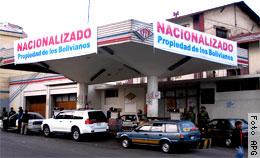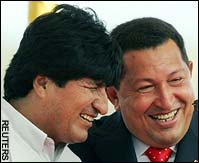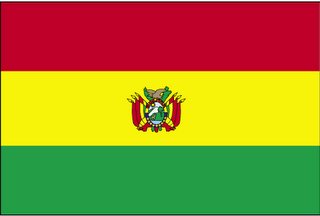Bolivia Takes Control of Hydrocarbons

The plan was delayed but the promise was held. On May 1st, a symbolic day of labor struggle and 100 days after Evo Morales became president, Bolivia gained control of its natural gas and oil resources. Multinational companies have been granted 180 days to renegotiate their contracts with the government or face expulsion.
The decree signed by President Morales at the San Alberto field in Tarija province, states that Bolivia “recovers ownership, possession and total and absolute control" of hydrocarbons.
Morales sent armed troops and “battalions of engineers” from the state owned energy company Yacimientos Petroliferos Fiscales Bolivianos (YFPB) to the 56 oil fields and 2 refineries, ensuring no interruption of production and to deter potential saboteurs.
There are more than 20 companies with oil and gas interests in Bolivia. The major players are Brazil's Petrobras, the Spanish-Argentine company Repsol YPF, British companies British Gas and British Petroleum, France's Total, and the U.S. Exxon Mobil Corporation.
All energy sales are to be channeled through the Bolivian government, which will pay companies for their services. Previously, Bolivian law said the state no longer owned the gas once companies extracted it from under ground.
Some reports have indicated that companies could receive as much as 50% of profits from production. However during the transition period, that sum will be 18% of royalties – an amount that had previously been paid to Bolivia while multinationals kept the lion’s share of profits.
 "The pillage of our natural resources by foreign companies is over," Morales declared.
"The pillage of our natural resources by foreign companies is over," Morales declared.Bolivian Vice President Alvaro Garcia said the government's energy-related revenue will jump to $780 million next year, an increase of almost 600% from 2002.
Bolivia’s decree immediately drew criticism from governments around the world. German Foreign Minister Frank-Walter Steinmeier warned that the move could have a serious impact on the Bolivian economy, affecting Bolivia's relationships with its Latin American neighbors, and its economic and trade relations with Europe.
Most heavily impacted are Spain’s Repsol and Brazil’s Petrobras. With investment over $2 billion, Petrobras is one of Bolivia’s largest foreign investors, owning 14% of the country’s gas reserves and controlling 95% of Bolivia’s refining capacity. Currently Brazil receives 50% of its natural gas from Bolivia.
The Brazilian Petrobras President Jose Sergio Gabrielli told Brazil's Globo Television Network: "There's no way that new investment in gas production with 18-percent return can be viable, these conditions make gas operations practically impossible in Bolivia."
Officially, companies are taking a “wait and see” approach, expressing a desire to work with the Bolivian government. However, some companies have inferred an intent to seek international arbitration to settle the matter.
Meanwhile Venezuela and Bolivia are forging stronger ties as President
 Hugo Chavez and Morales created an alliance between YPFB and Venezuela’s state owned Petroleos de Venezuela (PDVSA), to develop projects that will include the industrialization of Bolivia's huge natural gas reserves.
Hugo Chavez and Morales created an alliance between YPFB and Venezuela’s state owned Petroleos de Venezuela (PDVSA), to develop projects that will include the industrialization of Bolivia's huge natural gas reserves.Bolivia has the second largest reserves of natural gas in South America after Venezuela, estimated at more than 24 trillion cubic feet.
Labels: Evo Morales Bolivia, karah woodward



